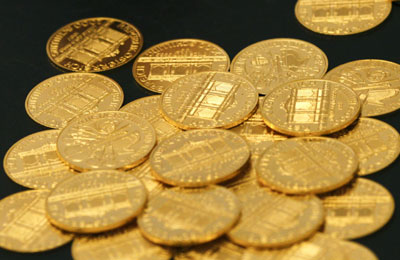
Risk assets slip on growth worries
Tokyo, April 18, 2013
Risk assets slipped broadly on Thursday, following the overnight drop in US and European equities on fears for global growth, and gold slid as money continued to flow out of gold-backed exchange-traded funds.
Recent data from China and the US fell short of market expectations and triggered this week's selling across markets, which some saw as a timely liquidation of one-sided positions built over the past several months, when optimism over US economic outlook boosted Wall Street to record peaks and lifted European shares to multi-year highs.
Oil prices tumbled for a seventh straight session, with Brent crude futures falling 0.5 percent to $97.22 a barrel after falling below $98 for the first time since July on Wednesday on overall concern about global oil demand.
US crude fell 0.6 percent to $86.19 a barrel after dipping below $86 earlier to a fresh four-month low.
GOLD SELLING MOMENTUM
Spot gold shed as much as 2.7 percent to a low of $1,339.86 an ounce on Thursday and last traded down 1.2 percent at $1,360.31. Bullion touched its lowest in more than two years of $1,321.35 on Tuesday.
US gold futures slid as much as 3.4 percent to a low of $1,335.60 an ounce on Thursday as holdings on SPDR Gold Trust, the world's largest gold-backed exchange-traded fund, slipped to their lowest level since April 2010.
"Gold's downtrend largely reflects changing preconditions that supported buying of bullion, and selling momentum is picking up as various bearish factors resonate with one another," said Koichiro Kamei, managing director at financial research firm Market Strategy Institute.
Kamei cited the Federal Reserve's Beige Book survey of economic activity which allowed for the possibility of the U.S. central bank scaling back its bond-buying stimulus later in the year. The Fed said on Wednesday the U.S. economy posted moderate growth between late February and early April.
"The gold-supportive macro environment is changing. Also, despite this ample central bank fund injections, few signs are emerging of heightening inflationary pressures globally. On top of that, investors may have run out of patience with reports of Cyprus central bank selling gold and ETF outflows pushing prices lower," Kamei said.
The MSCI's broadest index of Asia-Pacific shares outside Japan was down 0.3 percent, with its materials sector taking the hardest hit with a 1.7 percent drop as precious and base metals prices slid.
Japan's Nikkei average eased 0.4 percent.
Worries that slowing global growth will dent demand for raw materials hurt sentiment in resources-reliant Australian shares , which led the decline in regional bourses with a 0.7 percent fall.
"Markets are gradually realizing that the long-term commodity boom, or super-cycle as some people call it, that started around the turn of the century is now over," said Shane Oliver, head of investment strategy at AMP Capital Investors, of Australian stocks.
South Korean shares fell 0.3 percent, weighed by weakness in U.S. stocks on Wednesday which saw both the Standard & Poor's 500 Index and the Nasdaq Composite Index closed down more than 1 percent after disappointing corporate earnings reports. European shares fell to a 2013 low.
Apple fell below $400 a share for the first time since late 2011 after a poor revenue forecast from key supplier Cirrus Logic while Intel Corp, the world's largest semiconductor maker, forecast a sharp decline in its current-quarter revenue and trimmed its 2013 capital spending plans, weighing on its shares.
"The main board is tracking US stock declines as local institutions mainly offload shares in Apple suppliers," said Kim Sung-hwan, an analyst at Bookook Securities, of Seoul shares.
Copper, seen as a gauge for manufacturing and China-related growth, extended its losses, with London copper sliding 2.1 percent to $6,934 a tonne.
JAPAN STILL FAVOURED
Data from Japan showed positive signs of recovery, partly due to the yen's steady weakening as a result of the government's push for strong reflationary policies.
Japanese exports picked up in March from a year earlier, beating forecasts and offering hope that a weaker yen is starting to support a slow upturn in the export-reliant economy, and business confidence continues to improve.
The dollar steadied around 98.11 yen after touching a low of 95.67 yen on Tuesday, while the euro also steadied around 127.96 yen, above Tuesday's low of 125 yen . - Reuters







